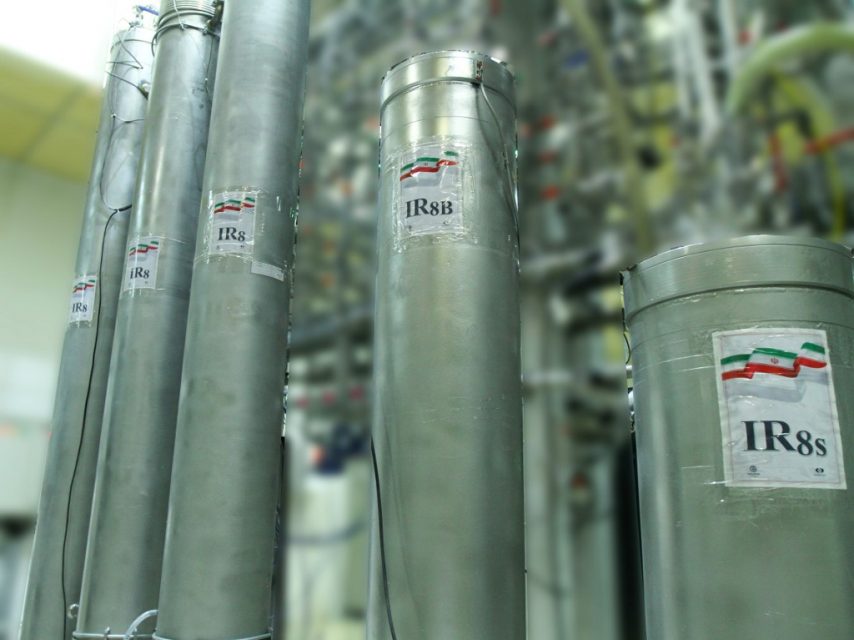
by Amir Havasi
TEHRAN, Iran (AFP) — Iran on Sunday announced its fifth reduction in its nuclear commitments, saying it will forego the “limit on the number of centrifuges”, as tensions with the United States soar after the killing of a top Iranian commander in a US strike.
Iran’s 2015 nuclear agreement with the United Nations Security Council’s five permanent members — Britain, China, France, Russia and the United States — plus Germany has been hanging by a thread since the US withdrew unilaterally from two years ago.
European countries have been pushing for talks with Iran to salvage the nuclear deal and the EU has invited Iranian Foreign Minister Mohammed Javad Zarif to Brussels for talks.
“Iran’s nuclear program no longer faces any limitation in the operational field”, the Iranian government said in a statement on Sunday night.
This extends to Iran’s capacity for enriching uranium, the level of enrichment carried out, the amount enriched, and other research and development, it said.
“As of now Iran’s nuclear program will continue solely based on its technical needs,” it added.
Until now, Iran has said it needs to enrich uranium up to a level of five percent to produce fuel for electricity generation in nuclear power plants.
Tehran said it would continue cooperating “as before” with the International Atomic Energy Agency.
The UN nuclear watchdog’s inspectors monitor the implementation of the deal with world powers, which also known as the Joint Comprehensive Plan of Action (JCPOA).
Iran’s latest announcement came after a US drone strike Friday killed the commander of the Revolutionary Guards’ foreign operations, Qasem Soleimani, in Iraq.
His death sparked fury in Iran, where he was considered a hero and Iranian leaders have vowed to avenge his death.
EU diplomacy
After pulling out of the nuclear accord in May 2018, the United States reimposed crippling sanctions on Iran.
On Sunday Tehran said if sanctions were lifted and Iran benefited from the nuclear deal, the Islamic republic “is ready to return to its JCPOA commitments”.
The three remaining European nations and China and Russia have led attempts to salvage the agreement.
The leaders of Germany, France, and Britain on Sunday agreed to work towards bringing about de-escalation of tensions, a German government spokesman said.
“The chancellor, the French president, and the British prime minister agreed to work together to reduce tensions in the region,” said the spokesman.
Following German Chancellor Angela Merkel’s telephone calls with France’s Emmanuel Macron and Britain’s Boris Johnson, the spokesman said the leaders were “in agreement that de-escalation is now urgent”.
“Iran, in particular, is urged to exercise restraint in the current situation,” he added.
On Saturday, France urged Iran to stick to the landmark 2015 accord.
“France fully shares with Germany the central objective of de-escalation and preservation of the Vienna (nuclear) accord,” Foreign Minister Jean-Yves Le Drian said.
With China, “we, in particular, noted our agreement… to urge Iran to avoid any new violation of the Vienna accord,” he added.
The European Union’s foreign policy chief Josep Borrell invited Zarif to Brussels for talks during a telephone call this weekend.
“Borrell invited the Iranian Foreign Minister to Brussels to continue their engagement on these matters,” a press release on Sunday said.
During the call, he urged a “de-escalation of tensions” in the Gulf.
A regional political solution was the “only way forward”, Borrell said, underlining “the importance of preserving” the 2015 Iran nuclear deal.
He confirmed “his resolve to continue to fully play his role as coordinator and keep the unity of the remaining participants in support of the agreement and its full implementation by all parties”.
© Agence France-Presse







